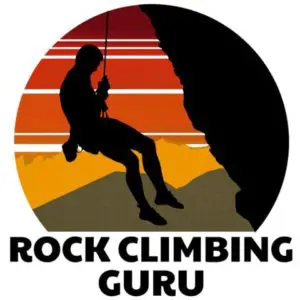Defining what it means to be an intermediate climber is not an exact science and is open to debate. I believe that there are certain criteria climbers must meet to be considered an intermediate and not just a beginner. These criteria are as follows:
As a general rule, a climber is considered an intermediate when they have been climbing for over 1 year and climb between 5.10a and 5.11d on the YDS. Intermediate climbers typically have a solid knowledge base in the different types of climbing and can effectively use various climbing techniques.
If you do not share any qualities of an intermediate climber described above, you may still be a beginner. To see if the classification of “beginner” is better suited to your current climbing status, check out my article linked here.
If you meet one or two of these criteria, you may be an intermediate. This article details each of the criteria used and explains what being an intermediate climber actually means. The criteria used are a bit more complex and are not as set in stone as meets the eye.
Classifying What an Intermediate Climber is
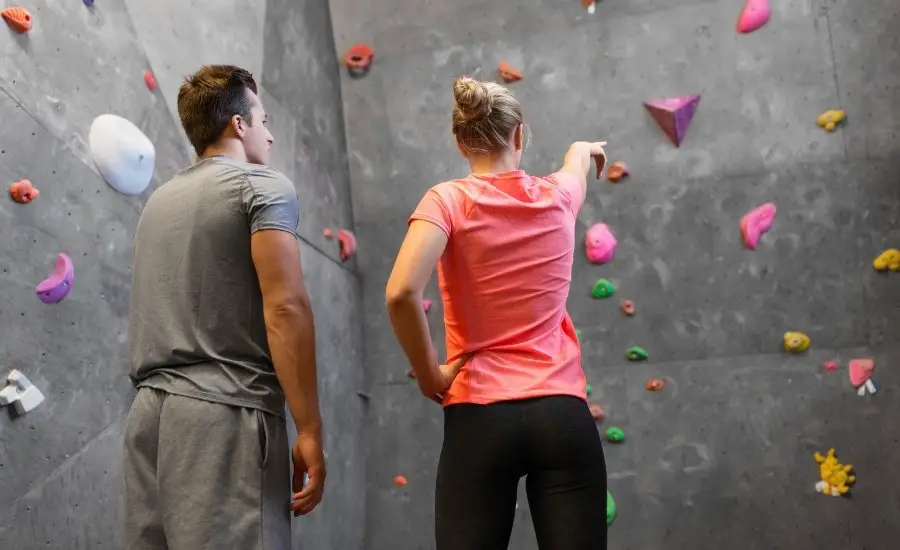
Defining the qualities of an intermediate climber is a bit more challenging than it first appears. To do so, I feel we not only need to evaluate a climber’s skill but also their knowledge and experience. Therefore, I used the following categories to determine who qualifies as an intermediate climber and who doesn’t:
- Maximum Climbing Ability – How hard you typically climb, not that one random route you can send which is 2 grades higher than your normal ability.
- Amount of Climbing Experience – Everything you have done in the sport from outdoor sport climbing to indoor bouldering.
- Cumulative Climbing Knowledge – What you know about climbing as a whole, not just a specific type or subsection of it.
Intermediate climbers must meet the definition of “intermediate” in at least one of these categories. It is not necessary to be classified as “intermediate” in all of them. That being said, most intermediate climbers will fit into multiple of these.
Let’s get into it and discuss what qualifies as an intermediate climber in each of these categories.
Intermediate Climbing Ability
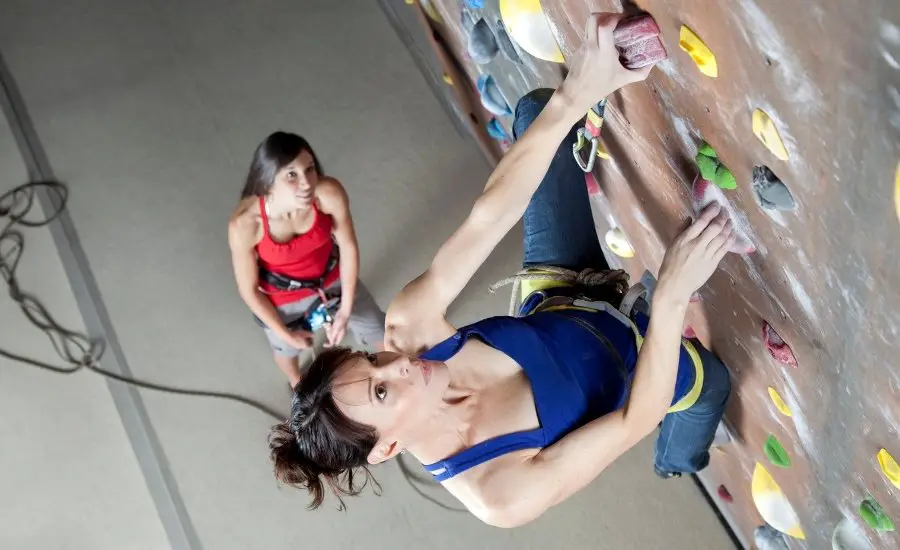
How hard a climber typically climbs is a great way to measure their climbing level. Most climbing routes and boulder problems are graded in such a way that a certain level of climbing knowledge and experience are needed to send them. However, there are certain climbers who are naturals that can climb way above their experience and knowledge levels.
If you are interested in seeing what the current prices are for the most popular rock climbing training aids, you can find them on Amazon by clicking here. Using the Amazon affiliate link above and/or other links in the article helps support this website.
The International Rock Climbing Research Association (IRCRA) wrote a Position Statement in which they defined climber categories (lower, intermediate, advanced, elite, higher elite) based on climbing grades across the different scales.
The Table below details the grades that intermediate climbers are expected to climb.
| Intermediate YDS Grades | Intermediate French/sport Grades | Intermediate Bouldering Grades |
| 5.10a | 5+ | V0- |
| 5.10b | 6a | V0- |
| 5.10c | 6a+ | V0 |
| 5.10d | 6b | V0+ |
| 5.11a | 6b+ | V1 |
| 5.11b | 6c | V2 |
| 5.11c | 6c+ | V2 |
| 5.11d | 7a | V3 |
On average, intermediate climbers climb between 5.10a and 5.11d on the Yosemite Decimal System (YDS) and between 5+ and 7a on the French/sport scale. Intermediate boulderers are expected to climb between V0 and V3.
Problems With Only Using Climbing Ability To Classify Climbers
It should be noted that the IRCRA Position Statement breaks up their intermediate climbing grade classification based on gender. It classifies females who climb between 5.11b and 5.11d as advanced instead of intermediate. I do not believe this is a relevant distinction due to the subjective nature of climbing grade ratings.
Like I mentioned above, these ranges should be used as average climbing grades. There will be certain routes that fit a climber’s skill set better than others. A 5.9 climber may be able to send a route graded 5.10c that is a perfect fit for their ability but fail on a 5.8 that is a terrible match for them. Always remember that climbing grades are subjective.
While the table above is a great place to start, it is not the end all be all criteria to use. I have seen natural athletes go out and send 5.10a their very first time climbing. This should not qualify them as an intermediate climber as they have literally no climbing knowledge, experience or technical skills.

Intermediate Climbing Experience
Climbers classified in the intermediate experience category will have a significant amount of experience under their belts. They will have experienced at least the three most popular climbing types (bouldering, top roping, and sport climbing) in both indoor and outdoor settings.
While they have not been climbing for decades, it certainly isn’t their first time in a gym or at a crag. Intermediate climbers should have enough experience to be comfortable in both settings and will have some helpful tips to give the newer climbers.
On average, intermediate climbers will have over 1 year of climbing experience. Climbing more frequently (i.e. 2-3 times a week) with a mixture of both indoor and outdoor climbing will shorten this duration. Any climber with less than 6 months of climbing experience is considered a beginner.
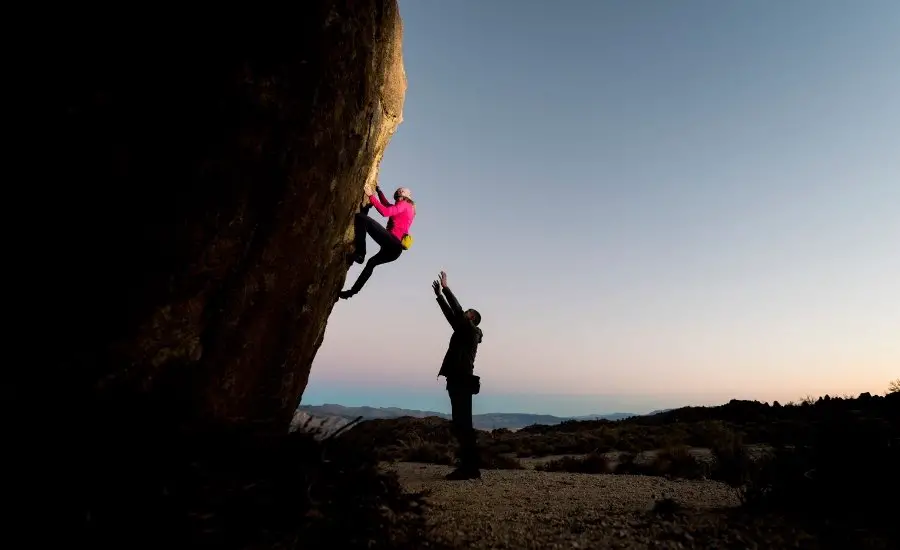
Climbing experience is necessary for climbers to know how their bodies will feel in different scenarios, figure out the proper beta, and get used to good and bad body position. Not only this, it will help give them reference points to call back on when learning new climbing information.
Intermediate Climbing Knowledge
While the term “climbing knowledge” is open to interpretation, I am using it here to refer to general climbing information. This can include (but is not limited to) climbing techniques, terminology, gear, types, etc.
It should be noted that climbing knowledge generally increases with climbing experience. However, this is not always the case. Some climbers may have years of indoor bouldering experience but will have never sport climbed or bouldered outside. While they have a bunch of climbing experience, they also will have a large gap in their overall climbing knowledge.
Intermediate climbers will have built up a solid knowledge base in the sport. They typically will be able to use common climbing terminology while climbing and some of the slang may start to creep into the everyday lingo. On top of this, they will be knowledgeable in the intricacies of various climbing equipment (shoes, harnesses, ropes, etc.)
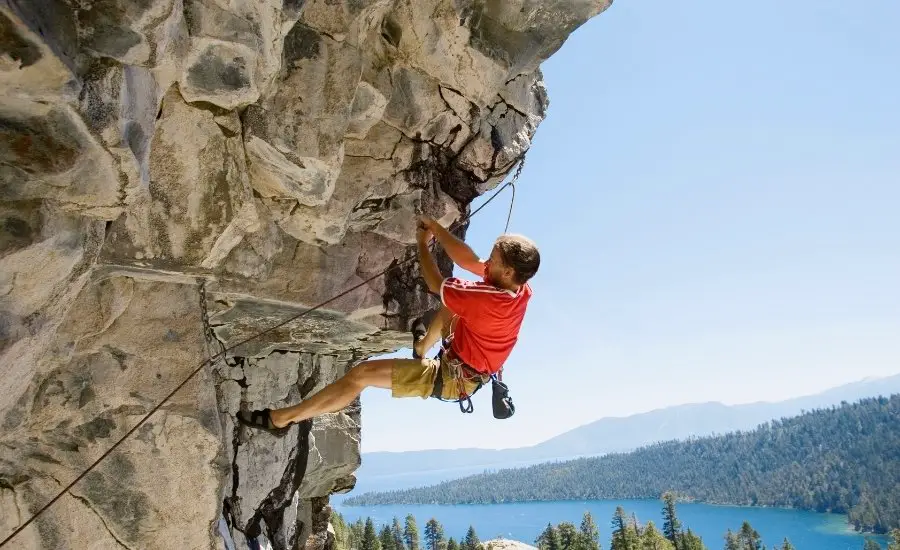
To me, the hall-mark of intermediate climbing knowledge is being proficient in sport climbing. Transitioning from bouldering/top rope to sport climbing requires climbers to increase their climbing knowledge by quite a substantial amount.
On average, intermediate climbers understand climbing fundamentals and can teach them to beginners. They will know how to properly belay, clip, and tie-in. Additionally, they will know correct climbing terminology, etiquette, and be able to perform climbing techniques such as toe hooks, heel hooks, and dynos.
While they are not experts in the sport yet, they know enough to be dangerous. This means they may be a little bit too confident with their climbing knowledge. They still have a lot to learn and should not get ahead of themselves.
The Bottom Line
Intermediate climbers will typically climb between 5.10a and 5.11d but there will always be exceptions to this. Climbing ability alone does not automatically make a climber an intermediate. To be an intermediate climber, one must have been frequently climbing for at least 6 months. In addition to having this experience, the climber should know the fundamental concepts of rock climbing and be able to teach them to beginners.
